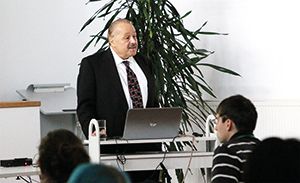European Short Course on Time-Resolved Fluorescence Spectroscopy Offered
PicoQuant, a research and development company specializing in optoelectronics and based in Berlin, Germany, is collaborating with Joseph R. Lakowicz from the Center of Fluorescence Spectroscopy (CFS) in Baltimore, Maryland, to offer a short course on the “Principles and Applications of Time-Resolved Fluorescence.”
PicoQuant, a research and development company specializing in optoelectronics and based in Berlin, Germany, is collaborating with Joseph R. Lakowicz from the Center of Fluorescence Spectroscopy (CFS) in Baltimore, Maryland, to offer a short course on the “Principles and Applications of Time-Resolved Fluorescence.”
The four-day event, taking place November 5–8, 2018 at the WISTA Campus in Berlin, features an in-depth introduction to fluorescence spectroscopy and its applications to scientific fields such as life and materials science. Researchers from academia and industry interested in using fluorescence spectroscopy methods are encouraged to attend the course, which encompasses a series of lectures with accompanying practical sessions focusing on various instrumentation and software.
Instructors include Joseph R. Lakowicz from CFS; Zygmunt “Karol” Grycznski from the Texas Christian University in Fort Worth, Texas; Ranier Erdmann, PicoQuant’s managing director; and other senior PicoQuant scientists with extensive experience in time-resolved fluorescence spectroscopy. The practical sessions will focus on steady-state and time-resolved measurements, as well as data analysis. Instruments will be provided by Agilent and PicoQuant.
Joseph R. Lakowicz giving a lecture during the time-resolved fluorescence course.

This year’s course will cover a range of topics, including the basics of fluorescence spectroscopy; instrumentation and data analysis, time-domain and frequency-domain measurements; anisotropy; solvent effects, quenching, Förster Resonance Energy Transfer (FRET); fluorescence sensing; fluorescence spectroscopy in biophysics and material science; and plasmon-controlled fluorescence.
For more information, please visit http://www.picoquant.com/trfcourse or contact Nicola Kasse at trfcourse@picoquant.com
How Satellite-Based Spectroscopy is Transforming Inland Water Quality Monitoring
Published: April 29th 2025 | Updated: April 29th 2025New research highlights how remote satellite sensing technologies are changing the way scientists monitor inland water quality, offering powerful tools for tracking pollutants, analyzing ecological health, and supporting environmental policies across the globe.
Chinese Researchers Develop Dual-Channel Probe for Biothiol Detection
April 28th 2025Researchers at Qiqihar Medical University have developed a dual-channel fluorescent probe, PYL-NBD, that enables highly sensitive, rapid, and selective detection of biothiols in food, pharmaceuticals, and living organisms.
The fNIRS Glossary Project: A Community-Sourced Glossary of Key Terms
April 28th 2025Established to develop a community-sourced glossary covering key functional near-infrared spectroscopy (fNIRS) terms, including those related to the continuous-wave (CW), frequency-domain (FD), and time-domain (TD) NIRS techniques, the fNIRS Glossary Project features over 300 terms categorized into six key domains: analysis, experimental design, hardware, neuroscience, mathematics, and physics. It also includes abbreviations, symbols, synonyms, references, alternative definitions, and figures where relevant.